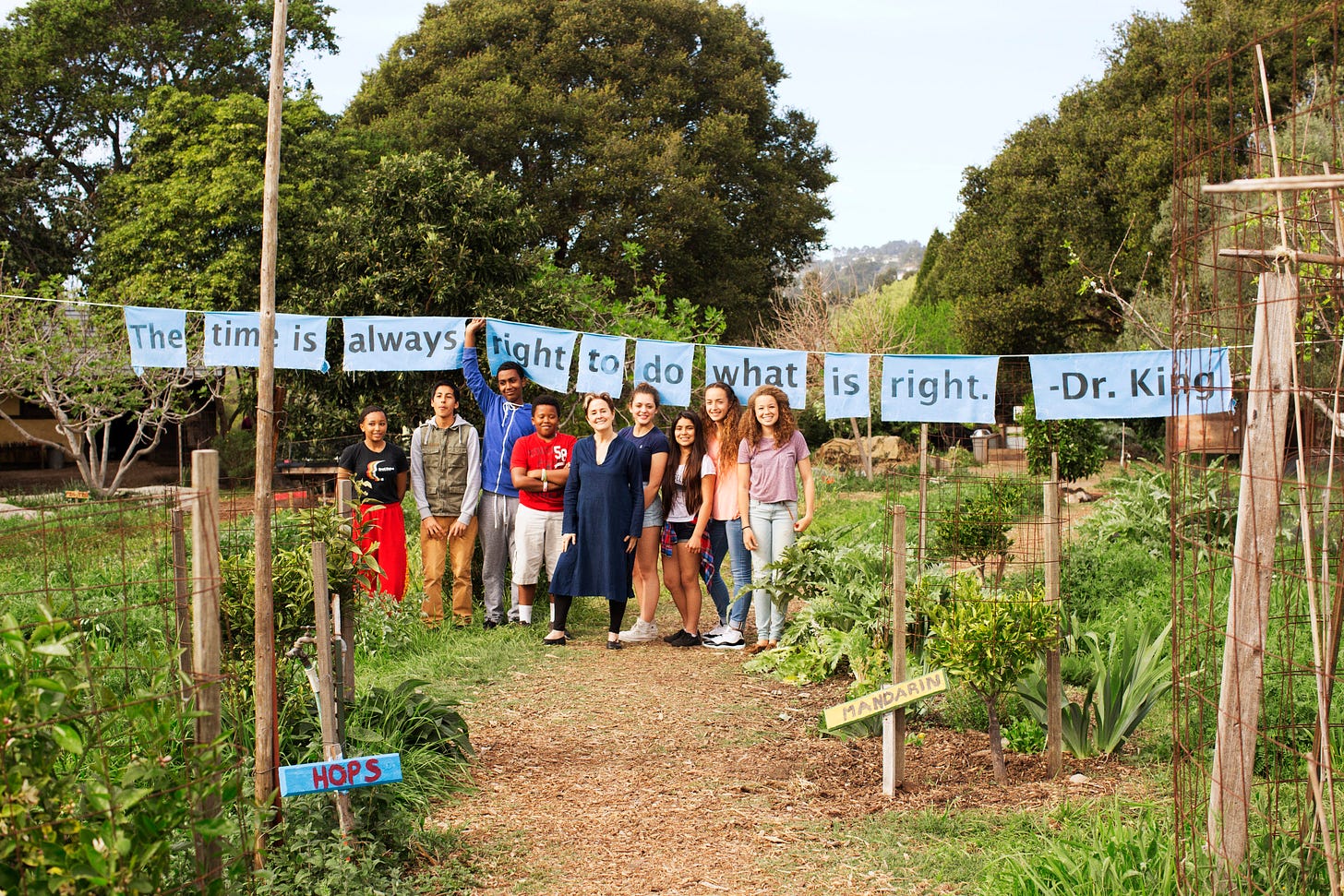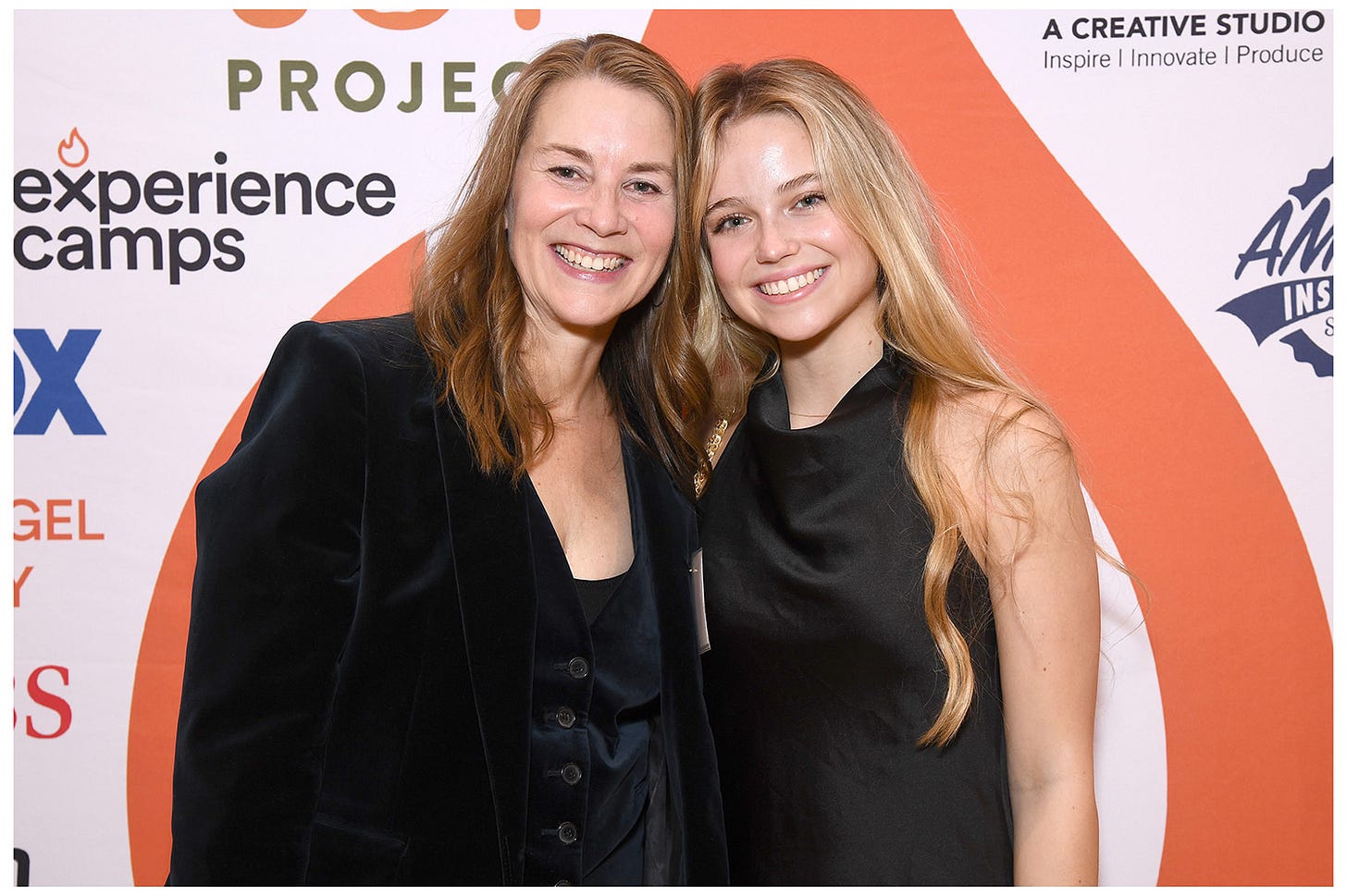#133: From farm to table, from grief to growth.
What a revolutionary chef taught me about loss, joy, and cultural transformation.
The Luminist is a reader-supported publication that illuminates the pain, the pleasure, and the paradox on the path to technicolor living. Subscribe below to receive posts about how loss teaches us to get the most out of life (along with silly gifs) in your inbox every Saturday.
On a Friday night in early May, I was collapsed on the Treehouse sectional next to Kendall, both of us wiped from our whirlwind trip to New York City. It wasn’t a book thing this time. It was a board thing — my first fundraising gala with Experience Camps for Grieving Kids, whose board I've just joined.
We scrolled through Netflix mumbling 'seen it,' 'too depressing,' and 'maybe later' until we finally landed on the final episode of "Chef's Table: Legends" featuring Alice Waters. I expected beautiful food shots and maybe a mild existential crisis about my own cooking skills. What I didn't expect was a lightning bolt of clarity about grief work.
Waters didn't just open her groundbreaking restaurant Chez Panisse and found the Edible Schoolyard Project. She launched a revolution. Americans had developed a toxic relationship with food — all TV dinners and Tang, completely disconnected from farms, seasons, and nutrition. She saw a culture that had forgotten how to eat.
As the episode explored more and more of Waters’ philosophy and strategy, my exhausted brain started connecting fuzzy dots. Something about this story felt frustratingly familiar…
Duh, Deagle!
Our culture has an equally broken relationship with grief.
We have no roadmap for navigating loss, no education, and certainly no vocabulary beyond "sorry for your loss" and "let me know if you need anything." This isn't a personal failing — it's a cultural one.
Both Waters and Experience Camps operate on a fundamental truth: to heal a broken relationship — whether with food or grief — you need more than information pamphlets and well-meaning advice. You need transformation. You need immersive experiences that show a better way is possible.
What I thought would be a relaxing zone-out turned into me incessantly pausing the show to scribble notes. Because Alice Waters is a culture-shifting genius.
She didn't start with children. She began by changing how adults thought about food — one meal, one restaurant, one farm relationship at a time. She had to change the cultural conversation among those who controlled the food systems before she could reach children.
Boom. The same holds true for grief. We can't possibly teach children healthy ways to navigate loss if we adults are still fumbling through our own pain, hiding our tears in bathroom stalls and changing the subject when someone mentions the person who died. We can't give what we don't have.
That's why I spend most of my time talking to adults about loss. That's what The Luminist is about, and what my book Do Loss (coming February 2026) will address. Before we can help kids, we need to convince adults that awkward silences and permanent brokenness aren't inevitable after loss. There are better ways forward — ways that honor both the depth of our pain and our capacity to laugh again someday.
Once the adult food revolution gained momentum, Waters recognized that children needed their own version — what became the Edible Schoolyard Project. She understood that early education could prevent the disconnection that was plaguing adults. Children needed to plant, grow, harvest, and cook food themselves to develop a healthy relationship with it from the start.

Experience Camps operates on a similar principle. Children who have lost a parent, sibling, or primary caregiver need more than what our regular education system provides. They need an immersive experience that combines the joy of summer camp with the wisdom of grief-informed community. (Many of the volunteer counselors have experienced their own personal tragedies, and some were campers themselves.)
Thanks to these communal experiences, kids discover they aren't the only ones whose dad had a heart attack or whose mom died of cancer.
They learn it's possible to grieve and honor and miss their person while still dominating the dodgeball court.
Through sharing circles and bunk conversations, they develop words for feelings that might otherwise stay bottled inside.
And most importantly, they experience what healthy grief navigation looks like — something many of their families and communities simply don't know how to provide.

The farm-to-table movement Waters sparked has grown far beyond Chez Panisse. Today, farmers' markets appear in suburban parking lots, organic has gone mainstream, and school garden programs exist across the country. What was once revolutionary now feels normal.
That's the vision for Experience Camps too. What if navigating grief became something we all learned to do? What if schools had grief-informed counselors? What if communities knew how to rally around bereaved families with more than just a week of casseroles? (Though let's be clear, those casseroles are clutch in the early days.)
The ripple effects, quite simply, would be enormous.
Children who learn healthy grief navigation become teens who can support grieving friends, adults who can show up authentically during crisis, and elders who aren't paralyzed by accumulated losses. Communities would become places where hard conversations happen with skill rather than awkward avoidance.
At their core, both Waters' work and Experience Camps require the same foundational courage: the willingness to look at an entrenched cultural pattern and say, "This isn't working. We can do better."
But here's what really makes both approaches revolutionary: They don't just criticize the status quo. They create vibrant alternatives that demonstrate a better way.
Waters didn't just write manifestos against processed food; she created mouth-watering meals from recognizable ingredients that made people say “I didn’t know a sweet potato could taste that good!” Experience Camps doesn't just lament our grief-avoidant culture; it creates transformative experiences where children discover they can carry both grief and joy simultaneously — often while making chaotic arts and crafts projects that their caregivers will treasure forever.

In case you’re not already galvanized, here are some numbers I’ve learned since joining the board of Experience Camps: Most children receive absolutely no guidance on navigating loss, despite the fact that six million children in the U.S. will experience the death of a parent or sibling by age 18.
Experience Camps currently serves over 1,200 children annually — an epic achievement, but a fraction of the need.
Just as Waters' vision took decades to transform American food culture, reshaping how we approach grief will take time. But we have to plant those seeds now, one camper, one counselor, one volunteer at a time.
My hope is that someday, we'll look back and wonder how we ever lived in a culture that left people so alone in their grief.
After all, just as we all must eat, we all will experience loss.
Learning to navigate it well isn't a luxury, it's essential nourishment for the human journey.

Done letting people starve,
P.S.
If you know a child or caregiver who would benefit from Experience Camps, you can find more info here: https://experiencecamps.org/our-programs
If you would like to donate to this incredible cause, please do so here: https://give.experiencecamps.org/campaign/689326/donate






